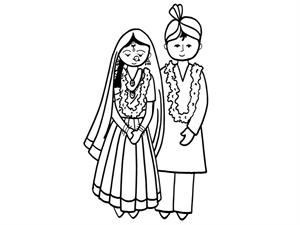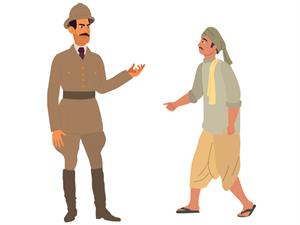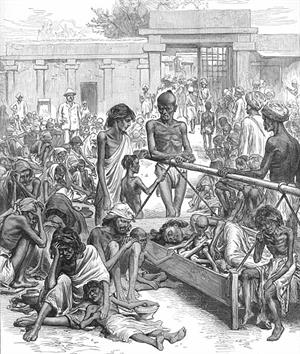
PUMPA - SMART LEARNING
எங்கள் ஆசிரியர்களுடன் 1-ஆன்-1 ஆலோசனை நேரத்தைப் பெறுங்கள். டாப்பர் ஆவதற்கு நாங்கள் பயிற்சி அளிப்போம்
Book Free Demo3. British Rule (1765-1836)
(Scene 1-2: Religious leaders can be seen speaking to a crowd of people)
Narrator: Religious leaders preached ideas like untouchability and child marriage.
Religious leader 1: Anyone who crosses the seas loses his religion.
Religious leader 2: All the misery in the world is due to women.
(Scene 3: Britishers can be seen having conversations with each other)
Narrator: The truth was that Indians had lost self-respect. The British scorned them.
British man 1 (addressing to another English man): The natives are unworthy of trust, incapable of honesty–
Indian man: True, your honour, but I am honest.
(Scene 4: A British man speaks to a poor farmer)
Narrator: Being merchants, the British wanted quick profits, their heavy taxes forced farmers to abandon their fields.
British man : You are still in arrears. If you don’t pay next week. I will send you to jail.
Farmer: But your men are taking all my crop!
(Scene 5: The Britishers can be seen discussing to each other)
Narrator: Still, the British invented other methods which gave them more profits.
British man 1: The goods manufactured in England should not have any import duty when brought into India.
British man 2: A good idea!
Narrator: The East India Company’s laws began to cripple Indian industries.
(Scene 6: Starvation of Indians)
Narrator: Inevitably famines followed. Between 1822 and 1836 fifteen lakh Indians died of starvation.
Narrator: The British policies ruined the expert artisans and their business.
The years from 1765 to 1836 led to the widespread of superstitious beliefs like untouchability, child marriage, and the inferiority of women. The religious leaders taught the people about the idea of untouchability. Untouchability refers to rejecting a group of people from important places in the name of custom, caste and religion. They were not allowed to come near those who considered themselves superior (higher castes), not allowed in temples and functions. The religious leaders even preached that people who "cross the seas" will no longer belong to their religion. Women were considered the major cause for all the problems like poverty and other miseries. This is the reason why young girls were forced to marry, thereby leading to Child Marriage. These practices were not only being done but were also being promoted by the superior people.

Child marriage
The Britishers started looking down upon Indians and initiated brainwashing the rulers against them. It was the primary strategy of the Britishers to bring the Indians under their control. They believed that Indians were not worthy of trust and "incapable of honesty". This was a way of making the Indian people as their slaves and they took power over them.
Every day the Britishers introduced new rules and regulations to torture the Indians. The Britishers needed quick profits in their business. So they increased heavy taxes on the poor farmers. As a result, the farmers had to give up their lands. When the poor farmers tried to raise question against the Britishers, they would threaten the farmers. The Britishers said they would put the poor farmers in jail if they did not pay their arrears.

The Britisher threatening the farmer when he was raising question
The Britishers continuously found many ways to exploit the people and to earn profits. For instance, the goods manufactured in England were being imported to India, and they won't be charged for importing. The England products were sold at high prices in India, whereas the products made in India were taken away at lower prices by the Britishers. As a result, there was an increase in poverty, and one could see the farmers' struggle. Not only this, such policies of the British East India Company destroyed the Indian industries too. The rule of the Britishers destroyed small businesses and individual artisans. Artisans lost their job because of the arrival of British East India Company.
Finally, the rule of the Britishers resulted in an extreme shortage of food and death. Between 1822 and 1836, fifteen lakhs of Indians died because of the scarcity of food.
Finally, the rule of the Britishers resulted in an extreme shortage of food and death. Between 1822 and 1836, fifteen lakhs of Indians died because of the scarcity of food.

Famine in India during British rule
Meanings of the difficult words:
S.No | Words | Meanings |
1 | Preached | Publicly proclaim or teach a religious message or belief |
2 | Untouchability | Belonging to the lowest-caste or the people outside the caste system |
3 | Child marriage | A marriage or similar union, between a child and an adult |
4 | Scorned | Showing contempt or disdain towards a person or object considered as unworthy |
5 | Misery | A cause or source of great distress or discomfort |
6 | Unworthy | Not deserving respect or attention |
7 | Abandon | Give up completely |
8 | Arrears | Money that is owed and should have been paid earlier |
9 | Import | Bring goods or services into a country from abroad for sale |
10 | Cripple | Cause severe and disabling damage to; deprive of the ability to function normally |
11 | Famine | Extreme scarcity of food |
12 | Starvation | Suffering or death caused by lack of food |
Reference:
National Council of Educational Research and Training (2008). Honeydew. Glimpses of the Past-S.D.Sawant(pp. 36-49). Published at the Publication Division by the Secretary, National Council of Educational Research and Training, Sri Aurobindo Marg, New Delhi.